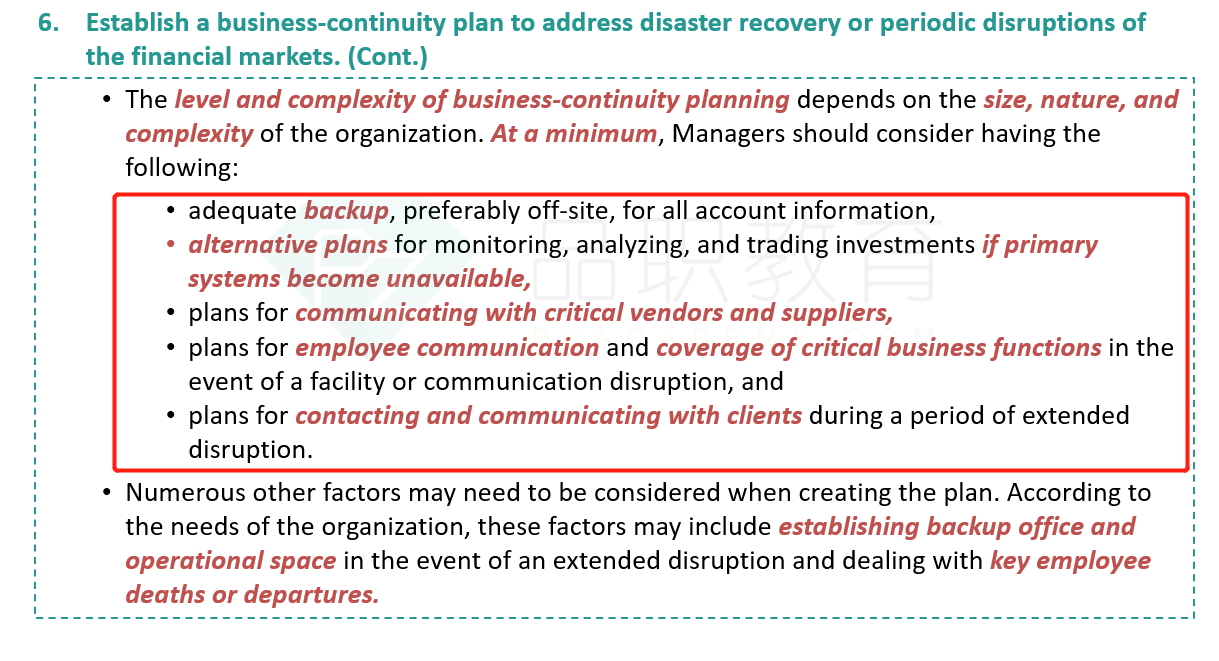Henry Schmidt, David Zane, and Andrew Ronoldo founded SZR LLC (SZR), an investment advisory firm managing portfolios for individuals. Although none of the founders holds the CFA charter, SZR has adopted the CFA Institute Asset Manager Code of Professional Conduct.
SZR’s client portfolios average $50,000 and are entirely invested in SZR’s commingled fund, managed by Ronoldo. Ronoldo implements a quantitative enhanced index process in SZR’s fund and has consistently added moderate performance (alpha) over the fund’s mid-cap benchmark index. After five years of strong performance, Ronoldo worries that the mid-cap fund will lag broad market indexes, so he decides to broaden the fund’s strategy. After doing research, he adds micro-cap, foreign, and convertible preferred stocks to the fund and doubles some holdings so that their weights are much larger than they are in the benchmark index. Since the fund achieves even stronger performance, both against the benchmark mid-cap index and major market indexes, Ronoldo plans to describe the new strategy in the company’s next annual newsletter, due to be sent to clients in three months.
As a prominent member of the community, Schmidt has just joined the board of a local company, Trezeguet Baking Company, which recently went public. Trezeguet’s shares are in most micro-capitalization (cap) indexes. As a board member, Schmidt receives a small annual stipend of $2,000; however, he is granted several thousand stock options, which he can exercise after 24 months’ board service. Since his stipend is insignificant and he will not exercise his options for at least 24 months, Schmidt does not disclose his Trezeguet board service to SZR clients.
One of SZR’s clients is president of Sastre International. Because of SZR’s success, this client hires SZR to manage $800 million of Sastre International’s corporate cash in a separate account, but asks that its hiring of SZR not be made public. Sastre’s board asks Ronoldo to direct all of the Sastre account trades through a local financial advisor, to thank the advisor for selecting SZR. Ronoldo is concerned that this direction may limit SZR’s ability to achieve best execution, but after Sastre acknowledges in writing that this is their preference, Ronoldo agrees to follow Sastre’s direction.
As head of operations, Zane wishes to simplify trading and implements a new trade policy: first place trades for the Sastre account through the local financial advisor and then submit the commingled fund’s trades through national brokerage houses and electronic networks. The local financial advisor is pleased with this arrangement, as he is able to buy securities before other clients; he informs Zane that he’ll recommend SZR to additional clients.
Schmidt, SZR’s sales director, sends the commingled fund’s stellar performance track record to several investment consultants, who serve as “gatekeepers” for large institutional clients, but he is told that SZR is too small to be considered by their clients. After Schmidt reveals that Sastre has recently hired SZR, and offers to negotiate the same special fee discount that has been given to Sastre, one consultant agrees to consider SZR for its clients. The consultant indicates that if SZR agrees to sponsor the consulting firm’s annual conference, Schmidt will meet many potential clients. Schmidt considers this conference sponsorship, but decides that it is too costly for SZR’s budget, so he declines the offer.
As SZR grows, Zane hires his brother-in-law, John Karna (top salesman for a local auto parts company) as Compliance Officer. Karna is tasked with writing SZR’s Code of Ethics and its Investment Policies and Procedures Manual. Karna is also put in charge of the firm’s Business Continuity Plan. The plan consists of his taking home, each evening, the computer records of SZR’s daily trades.
Does Karna’s role as Chief Compliance Officer, and the process of SZR’s Business Continuity Plan, respectively, conform to the requirements and recommendations of the CFA Institute Asset Manager Code of Professional Conduct?
A Neither Karna’s role nor the Business Continuity Plan conforms.
B Karna’s role conforms, but the Business Continuity Plan does not conform.
C Karna’s role does not conform, but the Business Continuity Plan does conform.
答案:A
为什么这里选择A?哪里没有遵守?




